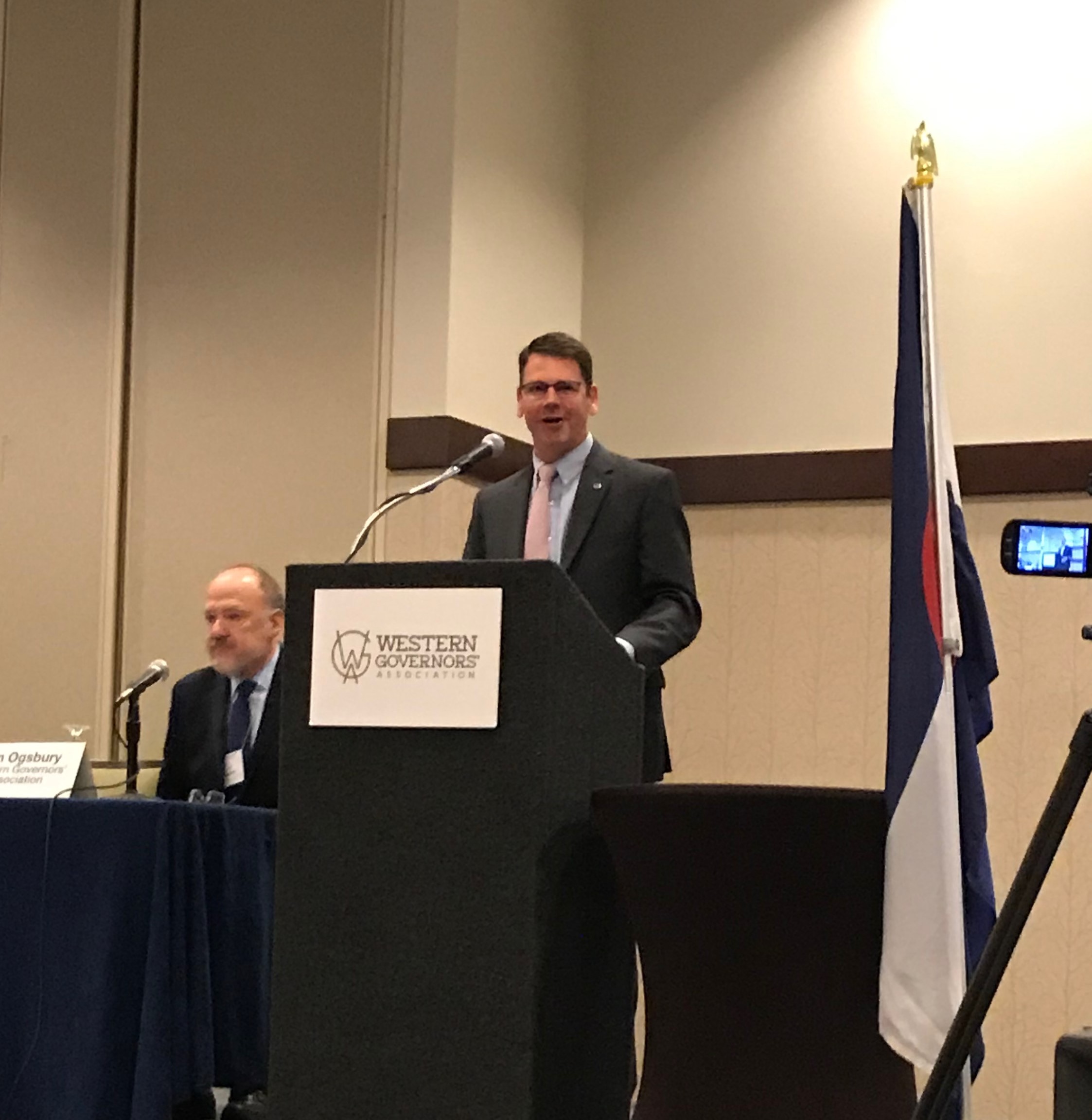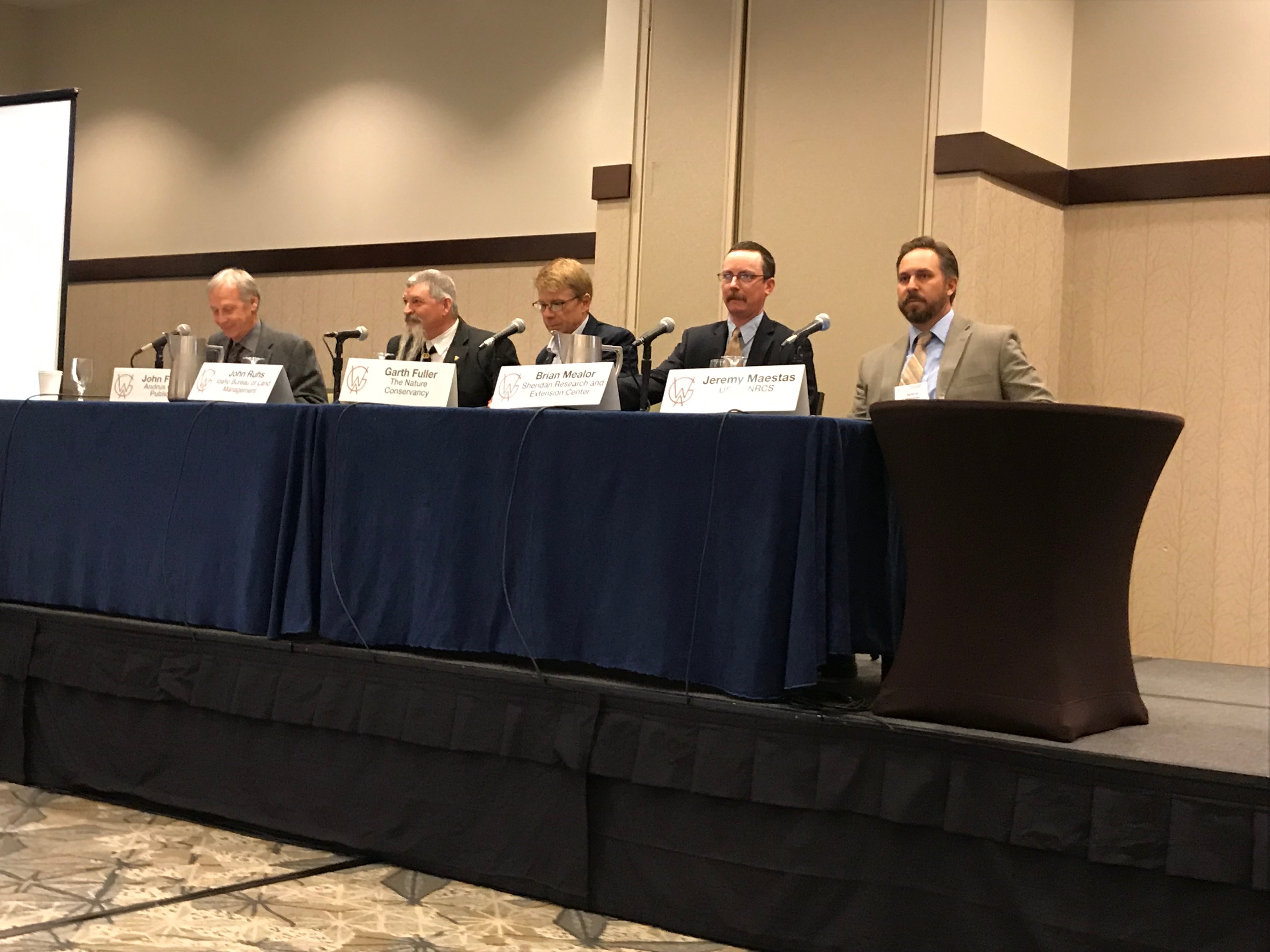SRM Attends Western Governors’ Association Working Lands RoundTable

SRM Staff attended the Western Governors’ Association Working Lands Roundtable in Denver, Colorado
SRM’s Outreach Coordinator attended the Western Governors’ Association, “Working Lands Round Table” in Denver earlier this month to elevate the Society’s role in this conversation on a regional and national level. The workshop delved into “at-risk species conservation, broad-scale threats to western working landscapes, and cross-boundary coordination in resource management and planning”. Several SRM members were also present at the event, including members of the Rangeland Invasive Species Committee.
The Round Table was opened by NRCS Chief, Matt Lohr, who expressed the “importance of working with partner agencies and NGO’s to multiply efforts”. Chief Lohr, a 5th generation farmer, voiced his perspective from his upbringing in agriculture and the lessons he learned in “protecting resources”. In his address, he referenced Working Lands for Wildlife and its success in working with producers to conserve 7.1 million acres of wildlife habitat that has helped many species such as the Greater Sage Grouse. As he stated, “Good things are happening and word is spreading…our challenge is there is still a lot of work to be done.”

NRCS Chief Matt Lohr, provided the opening address.
Western Governors’ Association Executive Director, Jim Ogsbury, articulated the theme of the meeting with his opening statements, “We have to figure out how to keep “Working Lands Working, while supporting collaborative conservation…We have to start looking at these issues in an integrated, collaborative way, promoting forest and rangeland health.”
Reiterated throughout the conference, were avenues to “build a better West through collaborative conservation”. This distinct directive was evident in the dialogues of each discussion panel, all offering unique perspectives and emphasizing varying aspects of rangeland management.
SRM participated in the “West-Wide Cheatgrass Management” work session, where multiple stakeholders expressed what is working, and what’s not working from their perspective. Discussion and brainstorming about realistic and tangible solutions for all stakeholders and how to implement these were discussed at length. Certainly, it’s no secret that cheatgrass management is a complex, multi-faceted issue, so it was encouraging to see so many bright minds discussing ways to collaborate on an issue that is so prevalent and interconnected within our fields of expertise.

BLM Idaho State Director and dedicated SRM member, John Ruhs, provided a detailed overview of Outcome Based Grazing during one of the panel discussions.
The workshop also included multiple panel discussions including, “Collaborative Conservation”, “Threats to Western Working Lands”, “Coordination Between Federal Agencies”, “Natural Resource Data Management and Landowner Privacy”, “Migration Corridors”, “Regulatory Certainty and Litigation”, “Case Study – Cross Boundary and Multi-Agency Collaboration”.
Each panel had multiple thought-provoking statements that evoked conversation on how to better serve working rangelands. We noted a few throughout the conference:
“The best thing we can do to keep lands and species healthy is to keep farmers farming and keep ranchers ranching”. – Paul Souza, US Fish & Wildlife Service
“As landowners we take seriously stewarding lands. We believe not only is it the right things to do, but the necessary thing to do…Collaborative conservation is the future.” – Lesli Allison, Western Landowners Alliance
“100 million acres of the West are invaded by cheatgrass, which is almost twice the amount of land covered by the entire National Parks system… Our Rangelands are incredibly resilient. We have time, we just need to act now.”
– Jeremy Maestas, Natural Resource Conservation Service
“If we lock ourselves into how we’ve been managing land for the last 50 years, we’re never going to improve. We have to take what we’ve learned from the past and carry that forward. Independent linear solutions are not getting us where we need to go.” Garth Fuller, The Nature Conservancy

Several SRM members were panelists on the “Threats to Western Working Lands”
“The longer we stay in a state of landscapes dictated by invasive species, the harder it is to get back to an equilibrium dictated by the natural perennials…Instead of being reactive, we must be proactive in managing these species”.
–Brian Mealor, Sheridan Research and Extension Center, SRM Rangeland Invasive Species Committee
“There is a fundamental lack of good science to make informed policy decisions. What I’m seeing is a rush to make a decision, nailing that decision into the ground, and then fighting over it.” – Paul Ulrich, Jonah Energy
“We have more endangered species on our land by density than any other federal agency. We have 350 threatened and endangered species, a number of which exist only on DoD land. This requires a lot of collaboration to manage them.”
– Kristin Thomasgard-Spence, Department of Defense
“At it’s core, collaboration is about people. And it’s about values. We have to get to a place where we honor those values.” – John Ruhs, Bureau of Land Management
These quotes only begin to summarize the dialogue at the WGA Working Lands Roundtable. If you interested in viewing the discussions, CLICK HERE to view the livestream.
Our hats off to Western Governors’ Association for coordinating this outstanding event!
